If you've never been through a customer relationship management system (CRM) roll-out process, the jargon and processes can be a little confusing and challenging to get the hang of. Often when we work with clients on their CRM guided implementation, we get a lot of questions around what each step in the process looks like and why it's important.
We've put together this comprehensive guide to help you through your CRM journey and answer some of those FAQs. Let's get into it!
Jump to the section you're looking for:
Announcements & Updates
- Your CRM Roll Out Comms Plan
- Initial Email to Company
- Pre-Cut Over Updates
- Task Reminders
- Cut Over Email
- Post Cut Over Emails
- Final Email
Reports & Presentations
Meetings & Training
- Weekly Project Meeting
- Pre-Training Email
- On Day Training Email
- Post Training Email
- Additional Support Email
Team Engagement
Your CRM Roll Out Comms Plan
What is it?
Your CRM roll out comms plan is essentially a checklist that you can use to make sure you're staying on track and covering all bases when it comes to internal communication with you team.
Why is it important?
Without plan of best practice processes in place from the get-go, it can be really easy to go off track or miss important communications. You'll also be able to track how far through the CRM roll out process you are and keep track of your deliverables.
Here's a snippet of the internal comms plan we use and supply our clients to help guide them through the process. If you're interested in grabbing a copy for yourself, just let us know.

Initial Email to Company
Why is it important?
One of the biggest barriers companies come across when rolling out CRMs is getting internal buy in. Team members tend to appreciate a heads up so they know what to expect and any steps they need to take.
Make sure to include an outline of who will receive training, how and when they can expect the next update, what the timeline for roll out looks like and where people can go to request support.
The more questions you can answer in this email the better, as it sets the tone and expectations for what's to come.
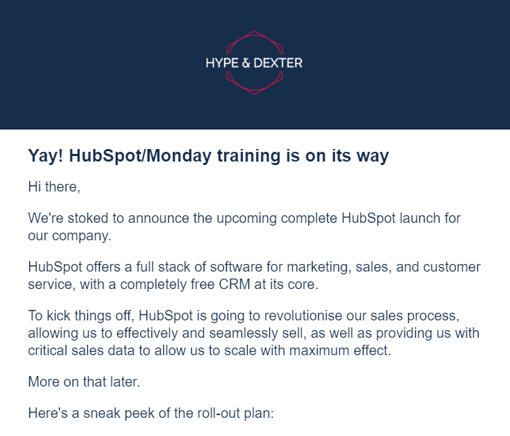
Pre-Cut Over Updates
What is it?
A short email sent a few days before making the switch to your new CRM, reminding your team that the big change is coming. This email should also include a more in-depth break down of upcoming timelines and some details around the old system and when to stop using it.
Why is it important?
It's important to remind your team what's happening - just in case they're not sure or have forgotten the exact timing of when you're making a change. Remember, your team are switching the tool kit they use on a day to day basis and that's a pretty big change, so it's useful for your them to know exactly when their last day using their current system is going to be so they can adjust to the idea.
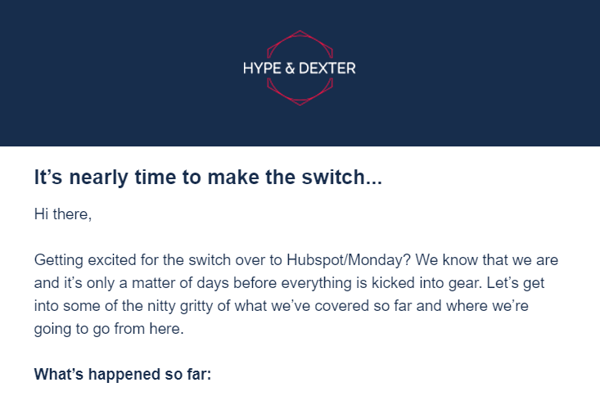
Task Reminders
What is it?
Task reminders should be delivered when required from the project manager to the assigned individual, in order to keep the roll-out on track and ensure that your team is across exactly what actions they need to take.
Why is it important?
Without task reminders it's easy for the small intricacies of a roll out to fall to they wayside, or even for your team to be confused on who's owning each task and when it needs to be completed.
All this needs to be is a quick email outlining what the task is and when it needs to be completed by. If your team member is running behind schedule, this also opens an opportunity for them to communicate back to you and let you know.
Cut Over Email
What is it?
A simple confirmation email letting your team know that you have officially cut over to your new CRM solution. This communication should also endeavor to outline any bugs or issues that have been picked up so far and link to where future issues will be complied.
Why is it important?
Put simply, you don't want your team wondering whether or not the change has happened or not! A quick confirmation and reassurance that you're noting down bugs and issues and have a plan in place to fix them will go a long way amidst a big change.
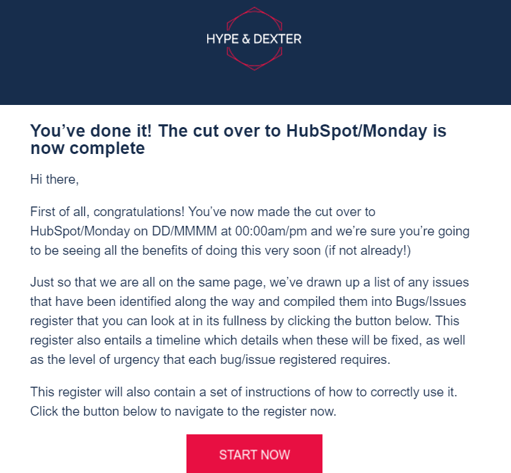
Post Cut Over Emails
What are they?
Post cut over emails are designed to follow-up with your team weekly, for up to 6-weeks after launch day.
Why are they important?
Each email should aim to address progress made since the last update email, any bugs and fixes that have occurred, quick wins, and most importantly offer your team an opportunity to reply to the email with any questions they might have.
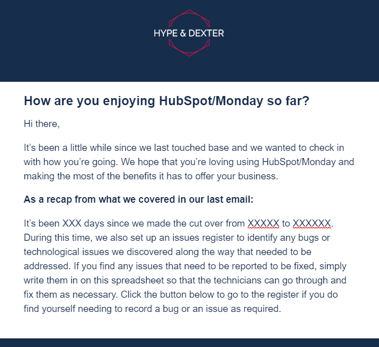
Final email
What is it?
If you've made it this far, congratulations! This is the final email sent out to your team to signify completion of your CRM roll out project.
In this email, you should aim to summarise what's been completed throughout the project, any wins or shout outs to key stakeholders, and let your team know where to go for support now you've reached the end of your CRM roll out.
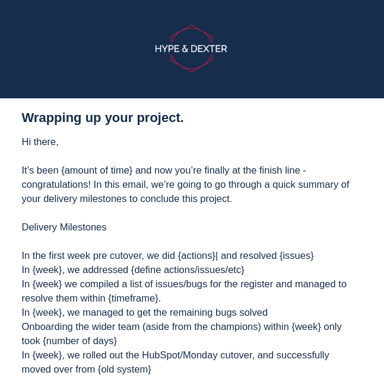
Why is it important?
It's key to let your team know when they've reached the finish line, but more importantly, where they can go for support now that you've finished the roll out. Usually questions will continue to pop up as your team gets used to the new configuration.
Project Status Report
What is it?
A project status report are timely updates on the progress of your project, including high level information, reports on critical project issues and a clear indication of whether the project is on track, at risk, or off track.
Why is it important?
The project status report should be delivered form the project manager to key stakeholders and the executive team, in order to keep everyone in the loop should issues or roadblocks arise. Your project reports will also streamline communications and answer a lot of questions from different stakeholders before they're asked - leaving more time for you to focus on your immediate tasks rather than fielding queries.
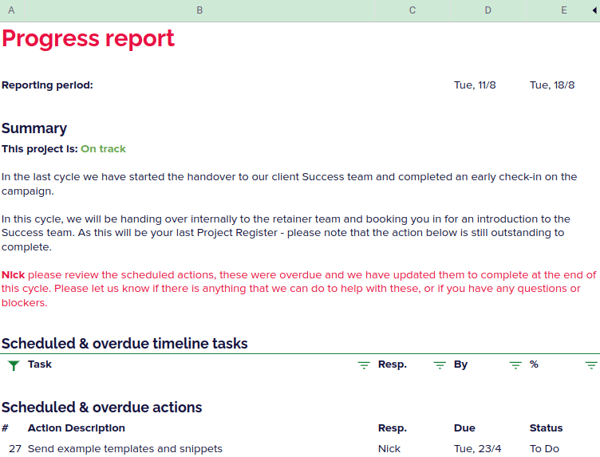
Project Review
What is it?
A one-off presentation of an internal review post-project completion to share the results, learnings and key takeaways from your CRM project roll out. This should summarise the milestones achieved as well as insights into budget and timeline accomplishments and oversights.
Why is it important?
All stakeholders will be informed of the results and have the opportunity to ask any questions, and the takeaways from this presentation can be used effectively to inform future projects.
Board Reports
What is it?
A monthly presentation from the owner of the project to the company board to inform them of the status, costs and any issues for the board to act on in relation to the project. It's also to retrospectively describe actions taken since the last board meeting, and actions to be taken within the next month of the project roll out.
Why is it important?
As the role of the board is to provide leadership to the company and deliver shareholder value over the long term, it's important for board members to be aware of how well a project is tracking, budgeting and cost updates.
Project Kick Off
What is it?
A meeting held one week before your project officially reaches kick-off to cover an overview of the process and what will be delivered, roles and responsibilities, and the proposed project schedule. Anyone who is is a stakeholder or will be involved in the project should be here to gain a clear understanding of what's required once the project is kicked off.
Why is it important?
This is the final meeting before jumping into your CRM roll out which is an immense undertaking. It's important for everyone involved to understand the goals, roles, responsibilities and stages of the process before diving in. If they're not yet clear, they'll have to opportunity to ask questions of the project manager.
Weekly Project Meeting
What is it?
A concise, one hour meeting to cover updates for key stakeholders on the status of agreed upon deliverables.
Why is it important?
Because the meeting is weekly, you'll be able to check off actions that were completed in the week prior and discuss things to be delivered in the following week. This will help to identify anything that has been missed or hit a road block.
It should only take around an hour to run and your key outcomes covered should be:
- Everyone understands what has been completed
- Everyone understands what work is upcoming
- Everyone understands, and can work towards removing, any blockers to the project
Pre-Training Email
What is it?
An email to remind your team of their upcoming training session, outline what they can expect and who is required to attend.
Why is it important?
One of the biggest problems we get when it comes to training sessions, is having either too many people attend, the wrong people attend or the wrong expectations set for people are going to get out of the sessions. This pre-training email clarifies each of these points and saves your team time in the long run as only the people who need to attend will attend, and they'll come to the meeting with clear objectives.
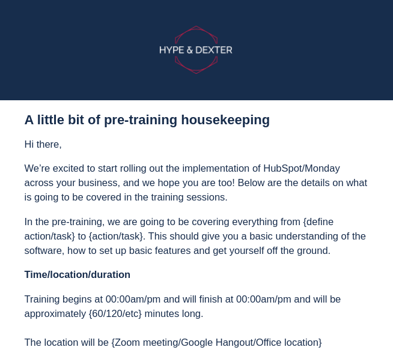
On Day Training Email
What is it?
An email sent on the day of training to reiterate what will be happening throughout the day and any crucial information your team should know before attending the session.
Why is it important?
A reiteration of the pre-training email to remind your staff of the key things they need to know (if they don't know them already, this will give them time to ask and prepare) and also a nudge to bring the right equipment into the session. Again, you'd be surprised how many people turn up without a laptop!
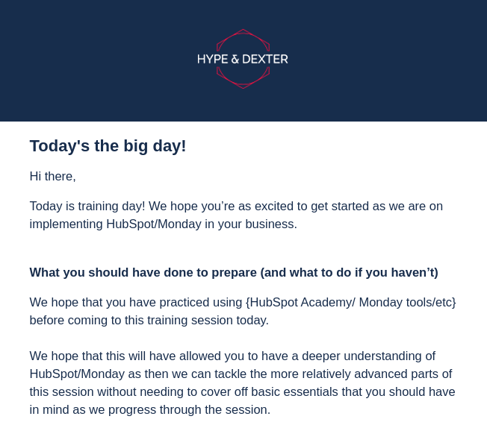
Post Training Email
What is it?
An email sent out as soon as your team has completed their training session that sums up the key takeaways and offers answers to Q&As.
Why is it important?
A follow-up email helps to answer those questions that your team will understandably have after their big training session. They'll have heard a bunch of new information and it's a good idea to have the key takeaways listed so they can refer back to them as they begin to use their CRM. You'll also have the opportunity to outline the next steps in this email so everyone is clear on where to go from here.
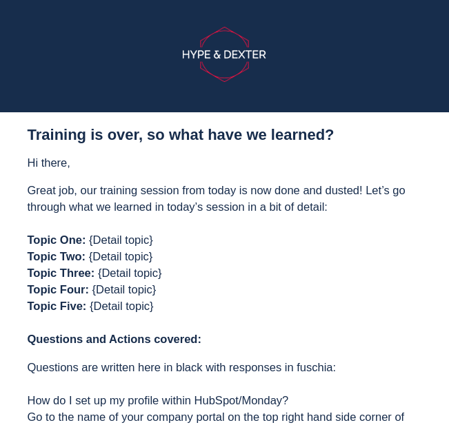
Additional Support Email
What is it?
An email to address a request for support from your team during the roll out process to either answer questions, or reassure your team of the measures you're taking to support them through it.
Why is it important?
A big change in any environment requires a lot of extra support and communication. You'll no doubt receive a lot of questions from your team members as they go through the learning phase of the process, and it's absolutely pivotal in change management to answer these questions efficiently and acknowledge the need for support and how you're going to address it.
This will reduce frustration from your team and make the transition a smooth ride, rather than a bumpy journey. You'll be able to set up an extra training session to go over these queries with your team if they need it.
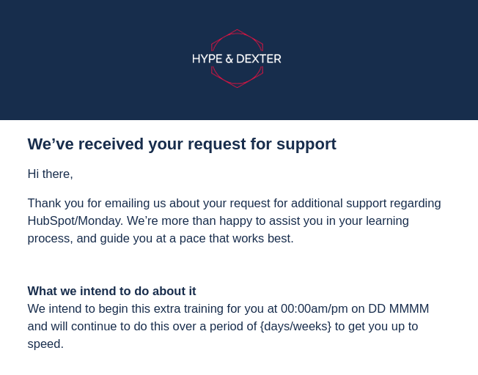
Champions Initial Outreach
What is it?
An email to your team to identify potential champions that will help your company through the roll-out stages of the project. This will be followed up with a meeting covering what will be required of your champions, an intro to the platform and the project ,including what we are doing, the timeline and who is involved.
Why is it important?
Your champions are absolutely crucial to the success of your CRM roll out, as they're the people who will be on the ground level helping your team to get the hang of things and communicating why it's important.
Often when people are finding new processes challenging, they'll question the validity of the change and resist - your champions are going to be the people working through this so it's important to reach out, identify them and train them early on in the piece.
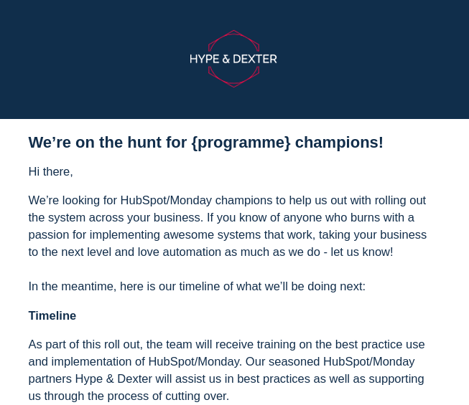
The main reason to become a Champion is that it’s a great personal development opportunity. The champions will be learning about elements of project management, becoming experts on the tools, and be a point of contact within their business.
But as well as additional responsibility, you need to layer in recognition and rewards to ensure the people you identify as potential champions want to be involved, such as merchandise, additional training and coaching, catering for additional meetings and time in lieu for longer hours worked.
Gamefication
What is it?
Gamefication is the application of the elements of a game to your project roll out, in order to encourage engagement and participation while making the experience a little more fun.
Why is it important?
It can be intimidating to learn something new from scratch, so gamefication is the perfect way to incentivise putting in the effort to do so. This process will be driven by your identified champions. Here's an example of a simple points table created to allocate points and rewards to gamify a HubSpot CRM roll out:
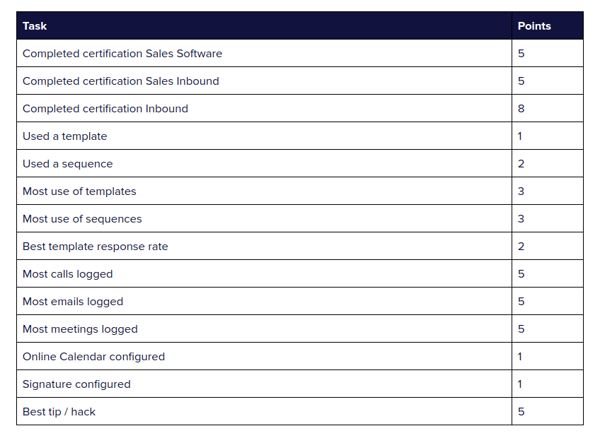
Once your points board is created, you can simply email it, print it, share a spreadsheet, and launch it within your organisation. We'd also suggest creating a leaderboard that you update on a weekly basis to show who is leading the way. You can have weekly as well as overall prizes.
There are also some excellent third-party gamifiers we'd recommend checking out:
Rewards
What is it?
Rewards are a part of the gamification process, adding prizes as incentive to participate in a project roll out game and rewarding your team members who are highly engaged and completing more complex tasks.
Why is it important?
This gives your team a tangible reason to get involved in the gamification process. It doesn't have to be anything too big, but enough to give your team a reason to get on board and participate.
Events
What is it?
Any event associated with your new project, for example a launch party or a celebration on your project completion date.
Why is it important?
Events are are a great way to help get your team on board, celebrate your successes and mark milestones. Usually, this falls on the project manager to organise and send out comms to. Ideally, your events should engage the whole company.
Surveys
What is it?
An online survey form that you can send to your team to fill out and collate answers and feedback around training needs, engagement with roll out and your teams' overall feelings post cut over. You can send a link to the survey our via email.
Why is it important?
The feedback you receive from your team will help you to identify weaknesses and areas that need improving as your company implements the new process. It'll also help you to understand where you could have done better for your next project roll out. You'll never know what was successful unless you ask!
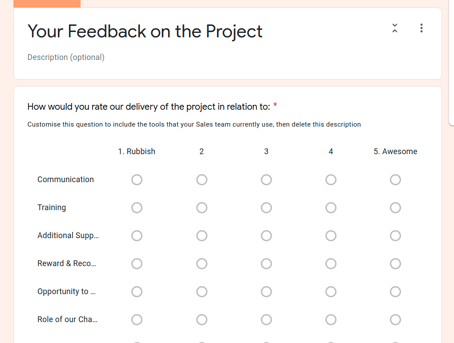

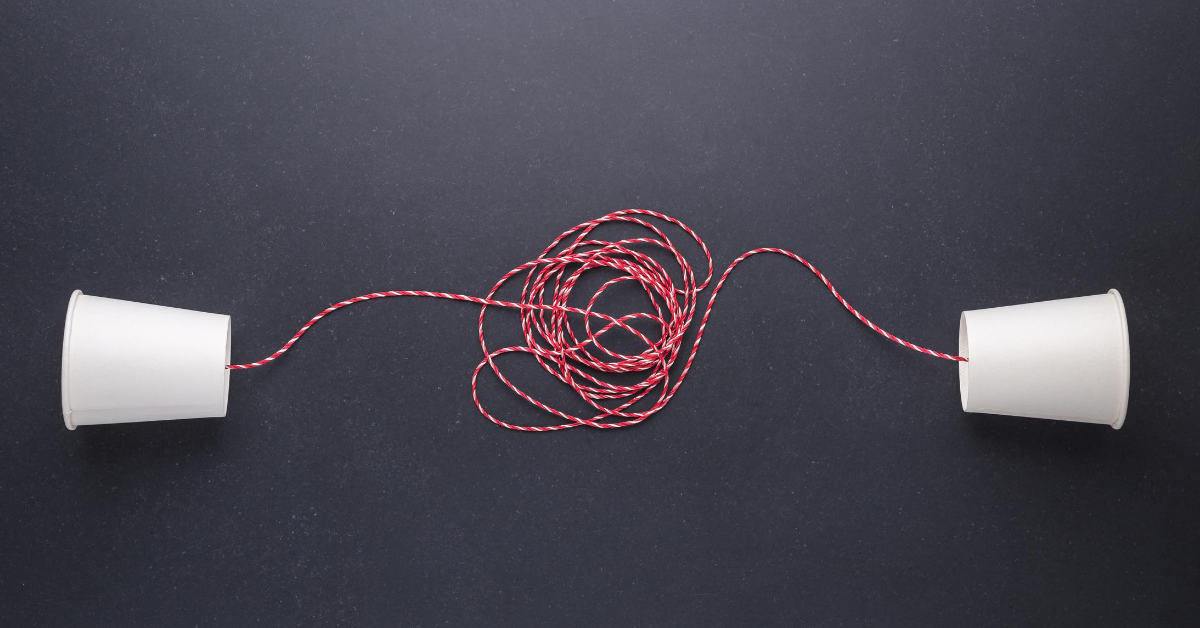


.jpg)
Comments